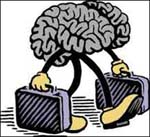News
The Brain Drain Comes Home
Apr 15, 2009
 In a service-based, high-tech world, it’s smarts that keep one country ahead of another, and the U.S. has always prided itself on both local and imported smarts to keep us on top. Our wild west form of democracy rewards the entrepreneurial spirit and, for all our fiscal problems and other societal drawbacks, we do provide a rich, laissez-faire environment for developing individual initiative.
In a service-based, high-tech world, it’s smarts that keep one country ahead of another, and the U.S. has always prided itself on both local and imported smarts to keep us on top. Our wild west form of democracy rewards the entrepreneurial spirit and, for all our fiscal problems and other societal drawbacks, we do provide a rich, laissez-faire environment for developing individual initiative.
Our imported smarts include such worthies as the large contingent of former Nazis, Werner von Braun among them, whom we spirited to our shores at the end of WWII to help us with our nuclear and space programs. We also depend on capturing and retaining students from abroad who come here to study in our famed graduate schools. Together with those we bring here on our H1-B program1 (and applications for that important resource are falling2), these graduate students—among the best and the brightest from their native lands—often find the allurements of our open democracy preferable to returning to countries with significantly fewer opportunities, and are enticed to stick around, ultimately winning a green card and citizenship.
That pool of potential smarts is drying up, however, according to a report from the Council of Graduate Schools.3 Following a precipitous 28 percent drop in the number of graduate school applications from foreign students during the chaotic early days of the Iraq and Afghanistan wars, subsequent rates of growth in applications have declined for the last three years, from 12 percent growth in 2006 to 4 percent in 2009.
India and South Korea are among the countries with the steepest decline in applications, having entered minus territory for the first time in 2009 (-9 percent and -7 percent, respectively). We have only held to positive growth in 2009 thanks to increased applications from China (16 percent) and the Middle East and Turkey (20 percent).
Is the bloom off the American rose? Let us hope not. Whether the 21st century will be another American century, a Chinese century, or some other century, it will for certain be a century in which high-tech smarts will drive the advancement of industry and of society. In all the realms of pure and applied science, we will move further toward understanding our world in this century than we have in all the previous ones combined.
Whether that understanding will be put to the service of a saner, more just and equitable world, or merely further the exploitation and misery so prevalent today will depend upon who harnesses those smarts, and our hopes still reside at home. For all our crimes and our shortcomings, and they have been as heinous and as unforgivable as any people’s in history, American exceptionalism is real, and the world knows it.
We expect the drop in the growth of graduate school applications is fallout from the Bush years, when the administration did everything it could to destroy our exceptionalism. It didn’t succeed, and if Obama can fulfill even a portion of his promise, we expect America to return to being the star that burns the brightest in the eyes of a world seeking peace and justice.
____________________
1 H1-B visa, from Wikipedia, accessed Apr 11, 2009.
2 Demand for H1-B visas tumble, by Patrick Thibodeau, from Computerworld, Apr 8, 2009, accessed Apr 13, 2009.
3 Growth in international applications slows for 3rd straight year, Apr 7, 2009, accessed Apr 11, 2009.
Copyright © 2008 All Together Now.